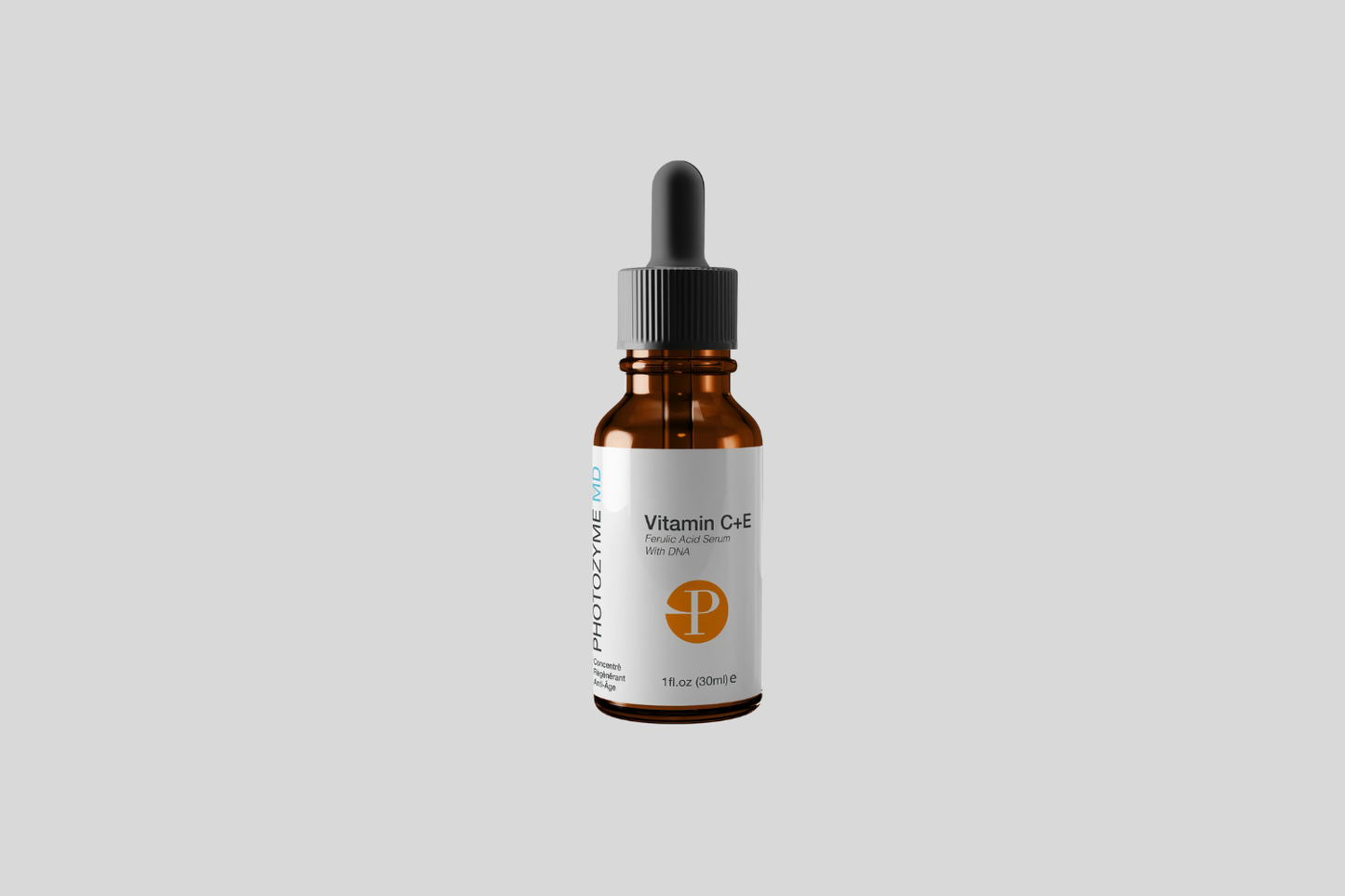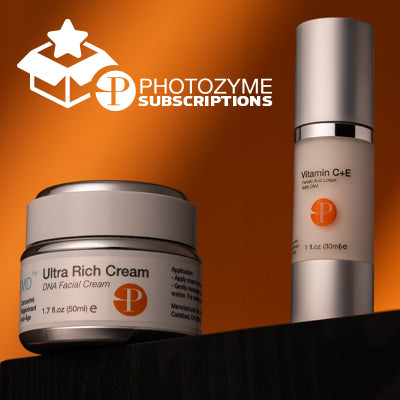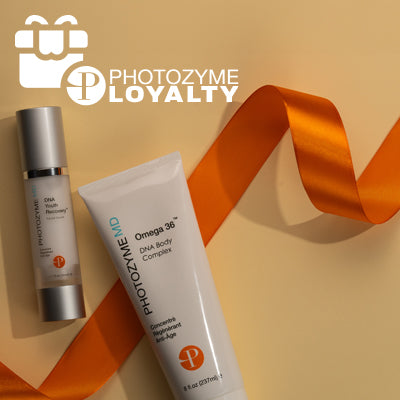
Key Takeaways:
- Niacinamide Benefits: Niacinamide is a versatile and gentle ingredient that boosts skin barrier function, reduces blemishes and fine lines, and controls sebum production.
- Vitamin C Benefits: Vitamin C, a potent antioxidant, helps in neutralizing free radicals, stimulates collagen production, and reduces pigmentation to brighten the skin.
- Niacinamide vs. Vitamin C: Choosing between niacinamide and vitamin C depends on specific skin concerns. Both offer complementary benefits that can be effectively combined in a skincare routine.
At Photozyme LLC, a pioneer in innovative skincare solutions based in Carlsbad, CA, we understand the importance of choosing the right products for specific skin concerns, especially regarding anti-aging. With a product lineup designed to address various skin issues, from hydration to protection, we're here to guide you through the nuances of niacinamide and vitamin C. This way, you can decide which ingredient or a combination of both can help you achieve your skincare goals.
In seeking youthful, radiant skin, antioxidants like niacinamide and vitamin C have emerged as skincare superheroes. These powerhouse ingredients are celebrated for their ability to fight signs of aging, brighten skin tone, and protect against environmental damage. However, with each boasting a unique set of benefits, it can be challenging to decipher which one should secure a spot in your skincare routine.
In this article, we will explore the unique benefits of niacinamide vs vitamin C, compare their effectiveness in addressing common skincare concerns, and guide how to choose between these powerhouse ingredients—or even combine them—for optimal skin health.
Understanding Niacinamide: Benefits For Your Skin
Niacinamide, also known as nicotinamide, is a form of vitamin B3 that plays a crucial role in the health and appearance of your skin. Its versatility and compatibility with various skin types make it a valuable ingredient in the skincare realm.
Benefits Of Niacinamide
- Boosts Barrier Function: Niacinamide supports the skin's barrier by increasing ceramide production. This helps retain moisture and protect against environmental damage. It is particularly beneficial for those with dry or sensitive skin, as it can enhance the skin's resilience.
- Reduces Appearance Of Skin Blemishes And Congestion: Regular use of niacinamide can help reduce the visibility of blemishes and skin congestion, leading to a clearer and more refined complexion.
- Minimizes Fine Lines And Wrinkles: Niacinamide plays a significant role in diminishing the signs of aging, such as fine lines and wrinkles, by promoting skin elasticity and collagen production.
- Evens Out Skin Tone: Niacinamide is known for its ability to lighten areas of pigmentation and age spots, contributing to a more even and radiant skin tone.
- Controls Sebum Production: For those with oily skin, niacinamide helps regulate sebum production, minimizing the appearance of enlarged pores and resulting in a smoother, matte complexion.
Exploring Vitamin C: A Powerful Antioxidant For Skin Health
Vitamin C, a vital nutrient and potent antioxidant, is essential to skin health. Its benefits in skincare are well-documented, making it a key ingredient in many products aimed at promoting a vibrant, youthful complexion.
Neutralizing Free Radicals
Vitamin C is renowned for its ability to neutralize free radicals and unstable molecules that can cause significant damage to the skin, such as accelerated aging, dullness, and uneven skin tone. By countering these free radicals, Vitamin C helps to protect the skin from premature aging, preserving its natural beauty and vitality.
Stimulating Collagen Production
Vitamin C is instrumental in synthesizing collagen, a protein crucial for maintaining the skin's elasticity and firmness. As we age, our skin's natural collagen production decreases, developing fine lines and wrinkles. Including Vitamin C in skincare formulations can help stimulate collagen production, enhance skin texture, and reduce the appearance of aging signs.
Addressing Pigmentation Issues
Vitamin C has shown remarkable efficacy in addressing pigmentation issues. It helps to inhibit the enzyme tyrosinase, thereby reducing melanin production. This can result in a more even skin tone and diminished appearance of dark spots, promoting a brighter and more radiant complexion.
Comparing Efficacy: Niacinamide And Vitamin C In Skin Repair
When choosing between niacinamide and vitamin C for skin repair, understanding the unique benefits and mechanisms can help tailor your skincare regimen to meet your needs.
Niacinamide: Strengthening The Skin Barrier
Niacinamide, also known as Vitamin B3, is a versatile skincare ingredient known for its ability to strengthen the skin’s barrier function. It increases the synthesis of ceramides, cholesterol, and fatty acids essential for a healthy skin barrier. This improved barrier helps retain moisture, leading to hydrated, plumper skin. Niacinamide is also anti-inflammatory, making it an excellent choice for those with acne-prone skin or rosacea. Furthermore, it has been shown to reduce the appearance of pores, fine lines, and uneven skin tone. For those concerned with hyperpigmentation, niacinamide can inhibit the transfer of melanosomes to skin cells, effectively brightening the complexion.
Vitamin C: Antioxidant And Collagen Booster
Vitamin C is a powerful antioxidant that protects the skin against environmental stressors like pollution and UV damage. Its primary role in skin repair involves stimulating collagen production, crucial for maintaining skin elasticity and firmness. By promoting collagen synthesis, Vitamin C reduces the appearance of fine lines and wrinkles, making it a staple in anti-aging skincare. Additionally, Vitamin C is renowned for its brightening properties; it can help fade hyperpigmentation and even out skin tone by inhibiting melanin production.
Combining Niacinamide And Vitamin C For Optimal Skin Benefits
While both niacinamide and Vitamin C are effective for improving skin texture and reducing signs of aging, their different mechanisms of action mean they can offer complementary benefits when used together. However, choosing one over the other might be more beneficial for those with particular skin concerns. Niacinamide is the go-to ingredient for individuals looking to enhance skin hydration, reduce inflammation, and minimize the appearance of enlarged pores. In contrast, Vitamin C is ideal for those protecting their skin from environmental aggressors, boosting collagen production, and achieving a brighter, more even skin tone.
Tackling Hyperpigmentation: Which One Prevails?
When addressing hyperpigmentation, a common skincare concern that manifests as dark spots or uneven skin tone, the efficacy of niacinamide and vitamin C is often questioned.
Niacinamide: Reducing Melanin Transfer And Soothing Inflammation
Niacinamide has been lauded for its ability to visibly improve the appearance of enlarged pores, uneven skin tone, and fine lines. Its mechanism for tackling hyperpigmentation lies in its ability to reduce the transfer of melanin to the skin’s surface. This can help minimize the appearance of dark spots and promote a more even complexion. Its anti-inflammatory properties also make it excellent for soothing the skin and reducing redness, which can be beneficial for those with sensitive skin or conditions like acne, which can exacerbate hyperpigmentation.
Vitamin C: Inhibiting Melanin Production And Promoting Skin Repair
Vitamin C is a powerful antioxidant known for brightening the skin and improving overall skin tone. It inhibits the enzyme tyrosinase, which is involved in melanin production. By doing so, vitamin C helps reduce existing dark spots and prevents new ones from forming. Additionally, vitamin C aids in the repair of damaged skin cells, encouraging new, healthy cells to replace the discolored ones, thus reducing the appearance of hyperpigmentation over time.
Combining Niacinamide And Vitamin C For Maximum Results
While both ingredients are effective in their own right, their benefits are not mutually exclusive. Incorporating niacinamide and vitamin C into your skincare routine could offer complementary benefits. However, you must be mindful of how you layer these products to avoid any potential irritation. Niacinamide can be found in products like Photozyme’s DNA Youth Recovery Facial Serum, formulated with innovative ingredients designed to address various skin concerns, including hyperpigmentation.
How To Choose Between Niacinamide And Vitamin C?
Understanding each ingredient's unique benefits and properties is critical to making an informed decision when selecting between niacinamide and vitamin C. Both niacinamide and vitamin C are powerhouse skincare ingredients, each offering many benefits for a wide range of skin concerns. However, one is more suitable depending on your specific skincare goals and needs.
Making Your Choice
Here’s how to choose between niacinamide and vitamin C based on common skin concerns:
- For Anti-Aging: Both ingredients are beneficial, but vitamin C's ability to promote collagen makes it particularly useful for those focusing on reducing wrinkles and improving skin firmness. In contrast, Photozyme's DNA Youth Recovery Facial Serum is an excellent example of how innovative products can integrate such powerful ingredients to target signs of aging.
- For Skin Brightening: Vitamin C is the clearer choice for those aiming to brighten their complexion and diminish dark spots. Its superior ability to inhibit melanin production ensures a more even skin tone.
- For Reducing Redness And Blotchiness: Niacinamide's anti-inflammatory properties make it better suited for calming the skin and reducing redness and blotchiness.
- For Sensitive Skin: If you have sensitive skin, niacinamide’s soothing properties are less likely to irritate than the sometimes-sting of vitamin C, particularly in high concentrations.
- Combining Both: For those intrigued by both benefits, it's worth noting that niacinamide and vitamin C can complement each other when used appropriately or found together in carefully formulated products such as those offered by Photozyme. The key is to pay attention to product formulations that ensure the stability and efficacy of these ingredients when combined.
Final Thoughts
When selecting between niacinamide and vitamin C, the choice doesn't have to be mutually exclusive. Both ingredients offer unique benefits that can enhance your skincare routine differently. Niacinamide is renowned for strengthening the skin's barrier, reducing inflammation, and minimizing the appearance of pores and fine lines. On the other hand, vitamin C is celebrated for its potent antioxidant properties, helping to protect against environmental damage, brighten the complexion, and promote collagen production.
At Photozyme, we understand the importance of incorporating high-quality, effective ingredients into your skincare regimen. Our product line, including favorites like the DNA Youth Recovery Facial Serum, is designed to address a broad range of skin concerns with innovative and proprietary blends. Whether you're looking to combat the signs of aging, enhance hydration, or provide your skin with a protective barrier against daily stressors, our products are formulated to deliver tangible results.
Read also:
- Retinol vs Hyaluronic Acid: Which One Should You Use First?
- Best Vitamin C With Ferulic Acid
- DNA Repair Enzymes: What Are They and How Do They Help Your Skin?
Frequently Asked Questions About Niacinamide vs Vitamin C
What is vitamin C?
Vitamin C, also known as ascorbic acid, is a potent antioxidant widely recognized for fighting free radicals, thereby protecting the skin from premature aging. It is also well-known for its skin-brightening properties, helping to fade dark spots and even skin tone.
Can you use niacinamide and vitamin C together?
While there has been some debate about combining niacinamide and vitamin C due to concerns about effectiveness and stability, recent formulations and studies suggest that when used properly, these two ingredients can be combined in a skincare routine to harness their benefits without compromising their effectiveness.
What are the benefits of niacinamide for the skin?
Niacinamide, a form of vitamin B3, offers multiple benefits for the skin, including improving the appearance of enlarged pores, regulating oil production, smoothing fine lines, and diminishing dullness. It also reinforces the skin's barrier function, improving its ability to retain moisture.
What are the benefits of vitamin C for the skin?
Vitamin C’s most notable benefit is its role in collagen synthesis, crucial for skin elasticity and firmness. Its antioxidative properties further protect the skin from environmental damage and effectively reduce the visibility of fine lines and wrinkles, promoting a youthful appearance.
What is niacinamide?
Niacinamide is a water-soluble vitamin that works with the natural substances in your skin to help visibly improve enlarged pores, uneven skin tone, fine lines and wrinkles, dullness, and a weakened surface.
How does niacinamide work in skincare?
Niacinamide helps reduce the impact of environmental damage because of its ability to improve the skin’s barrier (its first line of defense) and its antioxidant properties. This vitamin also helps the skin repair signs of past damage.




